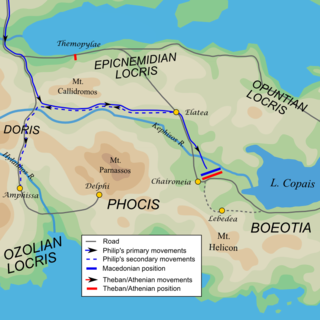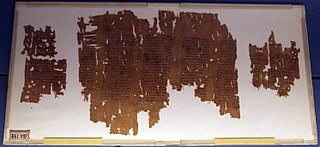Related Research Articles
This article concerns the period 379 BC – 370 BC.
This article concerns the period 389 BC – 380 BC.
This article concerns the period 369 BC – 360 BC

This article concerns the period 309 BC – 300 BC.

Philip II of Macedon was the king (basileus) of the ancient kingdom of Macedonia from 359 BC until his death in 336 BC. He was a member of the Argead dynasty, founders of the ancient kingdom, and the father of Alexander the Great.
Year 395 BC was a year of the pre-Julian Roman calendar. At the time, it was known as the Year of the Tribunate of Cossus, Medullinus, Scipio, Fidenas, Ambustus and Lactucinus. The denomination 395 BC for this year has been used since the early medieval period, when the Anno Domini calendar era became the prevalent method in Europe for naming years.

Year 338 BC was a year of the pre-Julian Roman calendar. At the time it was known as the Year of the Consulship of Camillus and Maenius. The denomination 338 BC for this year has been used since the early medieval period, when the Anno Domini calendar era became the prevalent method in Europe for naming years.
Year 336 BC was a year of the pre-Julian Roman calendar. At the time, it was known as the Year of the Consulship of Crassus and Duillius. The denomination 336 BC for this year has been used since the early medieval period, when the Anno Domini calendar era became the prevalent method in Europe for naming years.
Year 383 BC wasof the pre-Julian Roman calendar. At the time, it was known as the Year of the Tribunate of Poplicola, Capitolinu, Rufus, Flavus, Mamercinus and Trebonius. The denomination 383 BC for this year has been used since the early medieval period, when the Anno Domini calendar era became the prevalent method in Europe for naming years.
Year 369 BC was a year of the pre-Julian Roman calendar. At the time, it was known as the Year of the Tribunate of Fidenas, Cicurinus, Cossus, Cornelius, Cincinnatus and Ambustus. The denomination 369 BC for this year has been used since the early medieval period, when the Anno Domini calendar era became the prevalent method in Europe for naming years.
Year 364 BC was a year of the pre-Julian Roman calendar. At the time, it was known as the Year of the Consulship of Peticus and Calvus. The denomination 364 BC for this year has been used since the early medieval period, when the Anno Domini calendar era became the prevalent method in Europe for naming years.
The year 548 BC was a year of the pre-Julian Roman calendar. In the Roman Empire, it was known as year 206 Ab urbe condita. The denomination 548 BC for this year has been used since the early medieval period, when the Anno Domini calendar era became the prevalent method in Europe for naming years.

Hellenica simply means writings on Greek (Hellenic) subjects. Several histories of 4th-century Greece, written in the mould of Thucydides or straying from it, have borne the conventional Latin title Hellenica. The surviving Hellenica is an important work of the Ancient Greek writer Xenophon and one of the principal sources for the last seven years of the Peloponnesian War not covered by Thucydides, as well as the war's aftermath.
Phoebidas was a Spartan general who, in 382 BC, seized the Theban acropolis, thus giving Sparta control over Thebes. To punish his unauthorized action, Phoebidas was relieved of command. Nevertheless, the Spartans continued to hold Thebes. The Spartan king Agesilaus argued against punishing Phoebidas, on the grounds that his actions had benefitted Sparta, arguing that that was the only standard by which he should be judged.
Sphodrias was a Spartan general during the Spartan Hegemony over Greece. As governor of Thespiai in 378 BC, he made an unsuccessful attack against Athens without any order from Sparta. He was put on trial for this act, but unexpectedly acquitted, thanks to the support of the two Spartan kings, Cleombrotus I and Agesilaus II. This acquittal greatly upset Athens which rapidly concluded an alliance with Thebes against Sparta as a result.

Tiribazus, Tiribazos or Teribazus was an Achaemenid satrap of Western Armenia and later satrap of Lydia in western Anatolia.
The Second Athenian League was a maritime confederation of Aegean city-states from 378 to 355 BC and headed by Athens, primarily for self-defense against the growth of Sparta and secondly, the Persian Empire.

Classical Greece was a period of around 200 years in Ancient Greece, marked by much of the eastern Aegean and northern regions of Greek culture gaining increased autonomy from the Persian Empire; the peak flourishing of democratic Athens; the First and Second Peloponnesian Wars; the Spartan and then Theban hegemonies; and the expansion of Macedonia under Philip II. Much of the early defining politics, artistic thought, scientific thought, theatre, literature and philosophy of Western civilization derives from this period of Greek history, which had a powerful influence on the later Roman Empire. Part of the broader era of classical antiquity, the classical Greek era ended after Philip II's unification of most of the Greek world against the common enemy of the Persian Empire, which was conquered within 13 years during the wars of Alexander the Great, Philip's son.
The Boeotian War broke out in 378 BC as the result of a revolt in Thebes against Sparta. The war saw Thebes become dominant in the Greek World at the expense of Sparta. However, by the end of the war Thebes’ greatest leaders, Pelopidas and Epaminondas, were both dead and Thebes power already waning, allowing for the Rise of Macedon.
References
- ↑ Vermaat, Peter J.R. "Philippos II van Macedonie". Genealogie Online.
- ↑ Vermaat, Peter J.R. "Orontes I van Armenie". Genealogie Online.